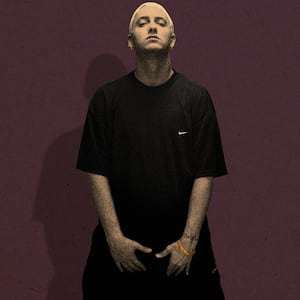Nicki Minaj’s latest album, Queen, has been plagued by setbacks since the rapper announced its release at this year’s Met Gala.
First, Minaj ran into some issues licensing a sample from Tracy Chapman, which resulted in the pushback of her album release date from June 15th to August 10th. In a rambling note accompanying a playlist she made for Apple Music earlier this month, Minaj delayed the release back further, to August 17th.
Luckily for Nicki stans, Queen was finally released today, despite the numerous date changes. An ambitious, if meandering, album featuring a total of 19 tracks a la Drake’s Scorpion, many fans think Minaj has finally staged her triumphant comeback with Queen after several years’ hiatus; her last album, The Pinkprint, was released back in 2014.
But the issues surrounding the release of Queen are hardly the album’s (or Minaj’s) biggest problems—Minaj recently came under fire for releasing a single with Tekashi 6ix9ine, a heavily tattooed, Brooklyn-based rapper who was convicted in 2015 of using a child in a sexual performance. According to the criminal complaint, videos of the 13-year-old victim were shared online; in one of them, Tekashi 6ix9ine (real name: Daniel Hernandez) stands behind the nude girl as she engages in oral sex with a separately charged defendant, thrusting his pelvis against her and slapping her buttocks. Hernandez, who was 18 at the time, would later claim that he was a minor when the incident occurred, and also told officials that the girl said she was 19, concluding petulantly, “I was charged with a charge simply because I was there.”
Hernandez’s past as a sexual predator didn’t seem to deter Minaj, however; the music video for their single, “FEFE,” features a childlike, Candyland-esque aesthetic—one that reads as downright disturbing considering Hernandez’s messy past. Minaj even enlisted Hernandez (as well as rapper Future) to accompany her on her upcoming tour, a move that many fans didn’t take lightly. And Minaj defended her decision to work with Hernandez, saying in the same note for Apple Music: “I did #FEFE with my new BFF from BROOKLYN. He’s a little funny looking but he’s really sweet under all those tats.”
Minaj’s support of Hernandez is troubling; previously lauded for preaching a gospel of female empowerment, where boss bitches can take over the world regardless of their color or size, Minaj’s decision to collaborate with Hernandez was confusing, to say the least. Unfortunately, Queen does little to dispel the rumors that Minaj is a hypocrite when it comes to women’s rights.
6ix9ine is still referenced in several of the songs on Queen—most notably the faux diss track “Barbie Dreams”—even though “FEFE,” thankfully, didn’t make it on the album. In “Barbie Dreams,” which details every rapper who’s tried (and most often failed) to bed Minaj, she raps about Hernandez, “Tekashi want a ménage, I said ‘tre-way’ / Curved him and went the Kim and Kanye way,” naming him in the same verse as Drake, Mike Tyson and Odell Beckham.
Another red flag comes with a cursory skim of Queen’s track listing: Minaj favorite and possible beau Eminem is featured on track “Majesty,” in addition to British rapper Labrinth. Eminem has long been a problematic fave of the music industry. Lauded for his anti-Trump freestyle at last year’s BET Hip Hop awards, the rapper is notorious for including misogynist and homophobic sentiments in his music—like threatening to punch Lana Del Rey in the face, concocting a rape fantasy with Iggy Azalea, repeatedly saying the word “faggot,” or using the term “gay” as an insult. While his verse on “Majesty” is relatively inoffensive (even though it drags on for far too long), there’s still something off-putting about Eminem’s inclusion on Queen, especially given Minaj’s recent collaborations. In the most recent episode of her Queen Radio show on Apple’s Beats 1, Minaj said of working with Eminem: “It’s refreshing to work with rappers who rap. I love a man who is humble enough—even when he’s that dude—to let a woman shine.”
Minaj’s inclusion of two notoriously predatory male rappers on Queen is at odds with the ethos of the album and of Minaj in general; in the same verse of “Barbie Dreams” where she mentions Hernandez, Minaj denounces DJ Khaled (“Had to cancel DJ Khaled, boy, we ain't speaking / Ain't no fat nigga telling me what he ain't eating”), seemingly in reference to Khaled’s ill-received comments from earlier this year about performing oral sex on women. In a now viral interview clip from 2015, Khaled revealed that he refuses to go down on women because “there are different rules for men,” while acknowledging that he still expects women to perform oral sex on him. Several musicians, including Smash Mouth (really), spoke out against Khaled’s double standard before Minaj dragged him in “Barbie Dreams.”
After the clip from Khaled’s interview resurfaced, many crowned him the new poster boy for male entitlement and double standards against women. But in light of Minaj’s latest collaborations, it appears that even pro-women, ostensibly feminist artists can propagate a similar, more insidious double standard. While Minaj, as a female rapper of color, is carving out a new space for women in the music industry, her unsavory, damaging connections with predatory men threaten to undo all of her hard-won success.







